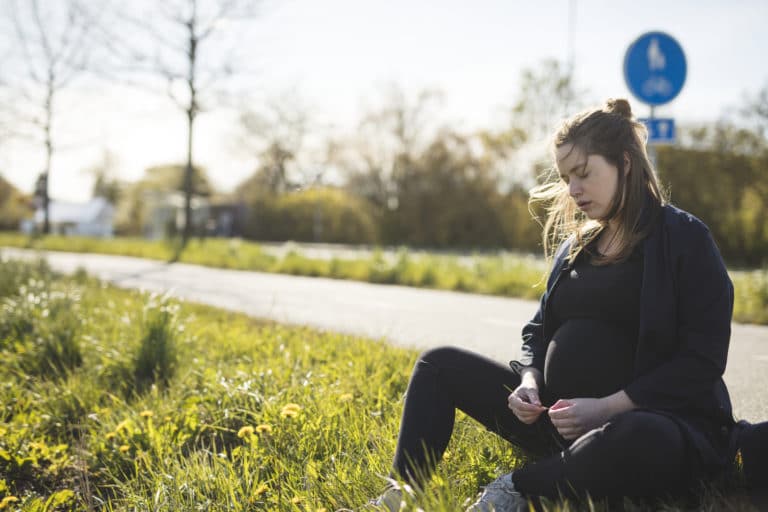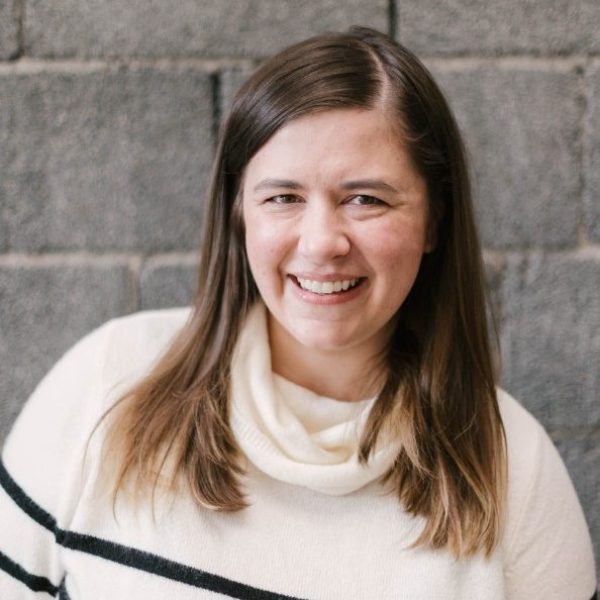
Image by Johner Images/Getty Images, © All Rights Reserved.
Parenting in the Aftermath of Trauma
There’s a picture of my mom on her wedding day, her belly swollen and round beneath a navy blue, floral maternity dress. I imagine her standing at the makeshift altar in my grandparents’ backyard as if it were a threshold in time — her marriage a trap door out of the trauma that had defined most of her life up to that point.
Just over a decade before that photo was taken, my mom’s twin brother fell into a thawing river and drowned as her parents drank at the neighborhood bar, a loss she never recovered from. The gold wedding band on her finger and the baby in her womb not only symbolized the beginning of a new life but the end of all the pain that was behind her. She was pregnant with me and pregnant with hope that her life had finally begun to curve toward redemption.
My mom always told me she wanted to be different than her parents, and at first, her love for me seemed to defy the trajectory of addiction and abuse they had set into motion for her. For the first years of my life, I lived under the covering of her warmth, not yet acquainted with the demands of her mental and physical illness. But as her physical and emotional pain converged with the responsibility of motherhood, her dependence on opioids evolved into addiction, and we traded roles. I began to lose my mom even before I really lost her.
She finally succumbed to her pain when I was 21 and fresh out of college. I decided then, just like I imagined she had, that the trajectory of my own life would take a sharp turn away from trauma. I vowed to myself I would never make the mistakes she did. I would never ask my future children to carry burdens that outsized them. I would, I was determined, stop the cycle that had rendered my mother powerless.
I took a pregnancy test of my own on a sun-dappled afternoon in my upstairs bathroom, a few weeks after my 25th birthday. Even then, four years after my mom’s death, I was no less determined to redeem the wreckage she had left behind. Like any new parent, I hoped that my children would have a better childhood than I did — but I expected I would be the one to make it happen.
I had my arc of redemption all planned out. My heroic motherhood journey would begin with a natural, medication-free birth, thanks to the Ricki Lake documentary I watched at eight weeks pregnant. I would then exclusively breastfeed, the hallmark of attachment parenting. I would respond to my son whenever he cried, no matter the hour, no matter if he needed me or not. He wouldn’t eat processed food or watch TV because we wouldn’t even own one. I would love him in boldface and all-caps, without thinking twice. My son would feel safe in my care because his life would be perfect. Because I would be perfect.
Single-handedly attempting to outrun a pattern that begun generations before me was my first — and gravest — mistake as a mother. I soon discovered I had set the bar so high that failure, and the need to self-medicate the resulting emotional fallout, was inevitable.
My descent away from my expectations began before I even birthed my son. Just a few hours after I arrived at the hospital, I screamed at my midwife for an epidural — because labor is a lot easier when you’re not actually in it. Recurrent breast infections made it difficult for me to breastfeed and eventually caused me to resent the howling, hungry baby who relied on me for food around the clock. And for the entire first year, I felt obligated to bolt out of bed and check on my son whenever he cried. He never slept, and neither did I. To the untrained eye, my frantic attachment parenting looked a lot like love. But at the root of it was a fear I couldn’t outrun.
The truth of it was, motherhood was hard, and I didn’t like the way it made me feel. I hated the way my new identity as a parent reduced me to my anxiety and proved me incapable of meeting my own expectations. So I muffled the pain and confusion with wine: at first, one glass, then two and three a night, and sometimes an entire bottle. A few times, I drank so much it made me sick.
With my puffy, green-hued face pressed against the porcelain toilet seat the next day, I realized I was trying so hard not to be my mom that I was becoming exactly like her. My attempts to mute the pain had only made it louder — so loud I couldn’t hear my son’s real needs. I may not have relied on prescription drugs to numb my pain, but my problem was rooted in the same in principle. I wanted to escape so desperately that my son lost me. I was wholly unable to care for him — or myself, for that matter — all because I was so obsessed with loving him the right way. The way I thought I should love him, not the way he needed to be loved.
For the first time since she died, I identified and even empathized with my mom and her addiction. Buzzed and broken, I had a glimpse of how my mom must have felt parenting among the shards of her own trauma. I knew what it felt like, in spite of the best intentions, to slowly slip into an unhealthy, even addictive pattern, at the cost of connecting with my child. I had told myself many of the same stories I imagine my mother told herself: that a good parent is a painless one; that it was my obligation to numb my emotions so I could be present, but more than that, so I could be perfect. Unfortunately, for both of us, self-medicating had the opposite effect.
Like my mother on her wedding day, I stood at a threshold in time. I had a choice: I could try to outdo my mom, or I could forgive her. I could perform for my son, or I could love him.
By some miracle I can’t explain (probably sleep deprivation-induced delirium), I took a gamble and chose the latter. After months of back and forth, I let my baby learn how to fall asleep on his own, even when his screams sounded just like my own abandonment. I let him watch Curious George on repeat and guzzle down baby food pouches when the days grew long and I needed space, even when I worried those things made me a lazy or inattentive mother. I allowed him to watch me wade through my grief, though it made me feel like I was failing him. I finally allowed myself to embody everything my mother instilled in me, the good and the bad. Even at the risk of being imperfect.
I thought perfection was the glue of secure attachment, that rewriting the story was the hallmark of redemption. But when I stopped running from the mother I didn’t want to be — when I forgave my mother for the narrative she unknowingly authored — I could finally give my son what he needed all along: my presence.
Parenting in the aftermath of trauma or abuse feels like being stretched between two generations, each with its own set of demands: As we nurture and soothe our own children, we are also tasked with learning to nurture and soothe ourselves, to restore what trauma stole and clear out what it imposed. The dual responsibility of presence with the pain and presence with our children feels unjust — until we begin to bear witness to our own resilience, the sacred space where our weakness overlaps with our strength. This is the real hallmark of redemption: that even among the shards, we pioneer tenderness. That somehow, we pour out from emptiness over and over, and love keeps growing back.
